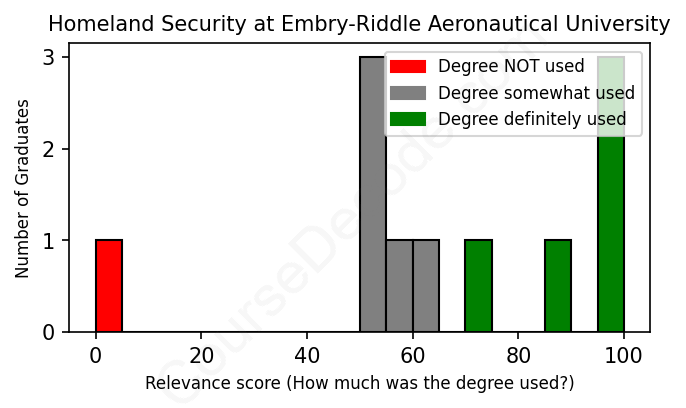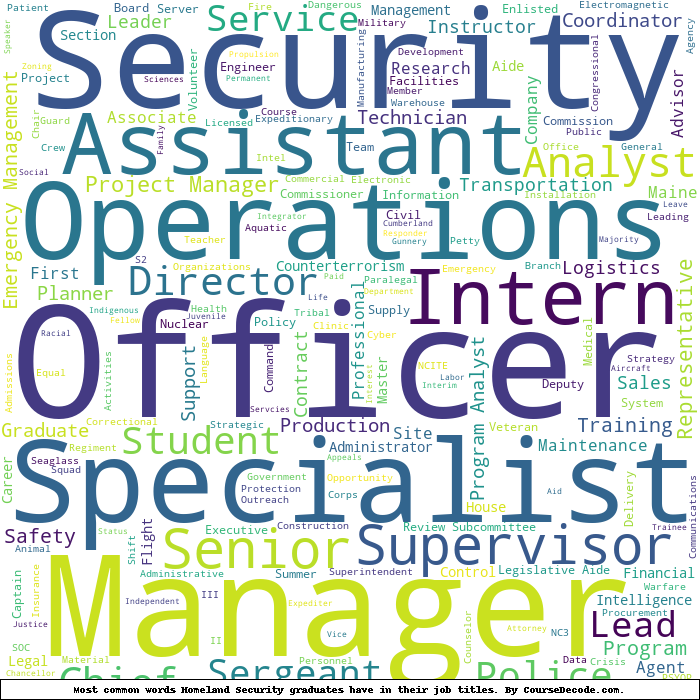
First, some facts. Of the Homeland Security graduates from Embry-Riddle Aeronautical University we've analyzed , here's how many have used (or NOT used) their degree in their career:

These are estimates based on AI analysis of 11 LinkedIn profiles (see below).
The verdict? Slightly below average. Overall, with an average relevance score of 66%, Homeland Security graduates from Embry-Riddle Aeronautical University have a slightly lower likelihood (-1%) of finding work in this field compared to the average graduate across all fields:
And for comparison, here's the chart for all profiles we've looked at across all degrees.
Also, after graduating, 36% of these graduates have pursued further education other than another Bachelor's degree (such as a Masters degree or other), compared to the average across all profiles of 35%. This suggests you may need more than just a Bachelors degree to be competitive as a Homeland Security graduate.
See the details:
|
Relevance score: 100% We think this person has gone into a career highly relevant to their degree. We think this person has gone into a career highly relevant to their degree.
DEGREE INFOGraduated in 2022 from Embry-Riddle Aeronautical University with a Bachelor of Science - BS in Homeland Security. No other secondary education since. JOB HISTORY SINCE GRADUATIONEmergency Management Specialist - Safety and Operations Orlando Health Feb 2022 - Jan 2024 ABOUTHello, my name is [NAME REMOVED] Butler. I have 2 years of experience in operations risk management, safety, emergency management response, disaster coordination, patient decontamination, training, drone operations, and project management. I am a certified decontamination trainer through the Center for Domestic Preparedness. I also have the following certifications: IS100, IS200, IS700, IS800, G300, G400, and Part 107. I have a BS in Homeland Security with minors in UAS and Cybersecurity Management from Embry Riddle Aeronautical University. I am currently looking for positions in emergency management, emergency preparedness, risk operations, safety specialists, and project management. |
The top 10 most common jobs done by the graduates we've analyzed (ranked most common to least) are:
Based on the LinkedIn profiles of individuals who graduated with a degree in Homeland Security from Embry-Riddle Aeronautical University, it seems like they’ve landed a mix of jobs that either align closely or only somewhat with their field of study. Many graduates have found roles in governmental or military contexts, like the Intelligence Officer or Congressional Aide positions, which clearly use the skills and knowledge from their homeland security education. These jobs directly involve national security policies and practices, making them very relevant. On the other hand, some graduates took paths that don’t directly tie back to homeland security. For instance, roles like English teacher or a server don’t really draw on any specific knowledge from their degrees.
When considering the overall relevance of their jobs, it’s a bit of a mixed bag. While there are quite a few positions in fields like emergency management, policy analysis, and security that align well with homeland security concepts, there are also numerous instances where graduates have taken on jobs that feel more like a stretch. For example, working as a developer or in commercial insurance might leverage some skills from their background, but these positions don’t focus primarily on homeland security principles. So, while there are certainly pathways that lead back to the degree, there are also quite a few that seem to diverge significantly from it. Ultimately, it’s clear that a Homeland Security degree can open doors to certain relevant careers, but it doesn’t guarantee that graduates will stick strictly to that field in their professional journeys.
Here is a visual representation of the most common words in job titles for Homeland Security graduates (this is across all Homeland Security graduates we've analyzed, not just those who went to Embry-Riddle Aeronautical University):

When looking at the career paths of graduates from Embry-Riddle Aeronautical University who studied Homeland Security, it seems like many of them have kicked off their careers in roles that are quite relevant to the field. For instance, right after graduation, many have landed jobs like Program Analysts, Intelligence Officers, and even roles in emergency management—these positions are definitely aligned with the core skills and knowledge from their degree. This suggests that fresh graduates are able to capitalize on their education and find jobs that put them right into the action of national security and public safety.
As we take a look at where these individuals are five or even ten years down the line, the trajectory remains largely positive. Graduates from a few years back are moving into roles with increased responsibility, such as leadership positions within the Air Force, or continuing their work in federal agencies. Some have even diversified their careers a bit, transitioning into roles that still have security elements but might not be purely focused on Homeland Security, like academic advising or positions in the airline industry. Overall, it seems that a degree from Embry-Riddle not only opens the door to solid entry-level jobs but can lead to fulfilling careers that contribute to national security and operations across various sectors in the long run. In short, many graduates appear to be carving out successful paths in fields that resonate with their studies, which is pretty encouraging for anyone looking into this degree program!
Getting a Bachelor’s degree in Homeland Security at Embry-Riddle Aeronautical University is definitely on the challenging side, but it's not impossible! The coursework covers a lot of ground, from emergency management to cybersecurity, which means you'll be juggling different subjects and skills. If you have a genuine interest in the field and are ready to put in the effort, you'll probably find it rewarding. But if you're someone who tends to coast through classes, you might find it a bit tougher than average. Overall, it's a solid mix of interesting topics and demanding projects, so be prepared to stay engaged and keep up with your studies!
Most commonly, in the LinkedIn profiles we've looked at, it takes people 3 years to finish a Bachelor degree in Homeland Security.
Looking at these graduates from Embry-Riddle Aeronautical University, it seems like many of them have landed some pretty decent jobs, especially considering the fields they're in. Those who went into government positions like the senior congressional aide and the intelligence officer likely have solid salaries and good benefits, typical for those roles. The airline captain and first officer positions are also well-paying, especially if they’re with major airlines. On the flip side, some of the newer grads have started with roles that might not pay as much right away, like server or intern positions, but they seem to be moving into more stable jobs in security and emergency management. Overall, it looks like most of these folks are on a promising path to earning decent money, with opportunities to grow in their careers.
Here is a visual representation of the most common words seen in the "about" section of LinkedIn profiles who have a Bachelor degree in Homeland Security (this is across all Homeland Security graduates we've analyzed, not just those who went to Embry-Riddle Aeronautical University). This may or may not be useful:

Here are all colleges offering a Bachelor degree in Homeland Security (ordered by the average relevance score of their Homeland Security graduates, best to worst) where we have analyzed at least 10 of their graduates:
| College | Score | Count |
|---|---|---|
 American Military University American Military University
|
74 | 33 |
 Embry-Riddle Aeronautical University Embry-Riddle Aeronautical University
|
66 | 11 |